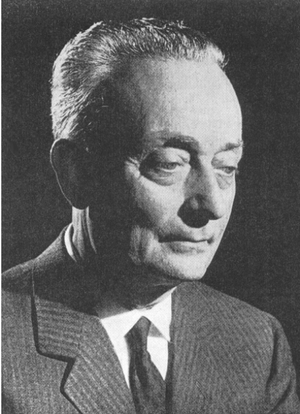Nicola Abbagnano facts for kids
Quick facts for kids
Nicola Abbagnano
|
|
|---|---|
 |
|
| Born | 15 July 1901 |
| Died | 9 September 1990 (aged 89) |
| Era | 20th-century philosophy |
| Region | Western Philosophy |
| School | Existentialism |
Nicola Abbagnano (born 15 July 1901 – died 9 September 1990) was an Italian philosopher. A philosopher is someone who studies big questions about life, knowledge, and what it means to exist. Abbagnano was known for his ideas on existentialism, which is a way of thinking about human freedom and responsibility.
Contents
About Nicola Abbagnano
Nicola Abbagnano was born in Salerno, Italy, on July 15, 1901. He was the first child in a family where his father was a lawyer. Nicola studied in Naples and earned a degree in philosophy in November 1922. His first book, Le sorgenti irrazionali del pensiero (1923), came from his university work. His teacher, Antonio Aliotta, was a big influence on him.
Early Career and Teaching
After finishing his studies, Abbagnano taught philosophy and history. He worked at the Liceo Umberto I° in Naples. From 1917 to 1936, he was a professor of philosophy and pedagogy (the study of teaching) at the Istituto di Magistero Suor Orsola Benincasa. During this time, he also helped edit a magazine called Logos with his mentor, Aliotta.
In 1936, he became a full professor of the History of Philosophy. In 1939, he joined the Faculty of Letters and Philosophy at the University of Turin. He taught there until 1976.
After World War II
After World War II, Abbagnano helped start the Centro di studi metodologici in Turin. This center focused on methods of study. In 1950, he and his student, Franco Ferrarotti, created a magazine called Quaderni di sociologia. In 1952, he also became an editor for the Rivista di filosofia.
From 1952 to 1960, he led a group of thinkers who wanted a "New Enlightenment." This group organized meetings for philosophers who believed in a "lay" philosophy. This means a philosophy not based on religion. They were also interested in new ideas from other countries.
In 1964, Abbagnano started writing for La Stampa, a newspaper in Turin. In 1972, he moved to Milan. He stopped writing for La Stampa but began writing for another newspaper, Giornale. In Milan, he became a Town Councillor for the Liberal Party. He also served as the Councillor of Culture, helping to guide cultural activities in the city.
Nicola Abbagnano passed away on September 9, 1990. He was buried in the cemetery of Santa Margherita Ligure. This was a coastal town where he often spent his holidays.
Nicola Abbagnano's Works
Abbagnano wrote many books and essays throughout his life. His early works, written while he was in Naples, include Le sorgenti irrazionali del pensiero (1923), Il problema dell'arte (1925), La fisica nuova (1934), and Il principio della metafisica (1936). These books showed his interest in how science works, influenced by his teacher Aliotta. He also wrote against idealism, a philosophical idea that reality is based on ideas.
Exploring Existentialism
After moving to Turin, Abbagnano began to study existentialism. This was a popular idea in Italian philosophy at the time. He developed his own unique version of existentialism in his well-known book, La struttura dell'esistenza (1939). He followed this with Introduzione all'esistenzialismo (1942) and a collection of essays called Filosofia religione scienza (1947). Another important book was Esistenzialismo positivo (1948). In 1943, he was a key part of a discussion about existentialism in a magazine called Primato.
New Enlightenment and Positive Existentialism
After the war, Abbagnano became interested in American pragmatism, especially the ideas of John Dewey. He also looked at neopositivism, which focuses on scientific knowledge. Abbagnano believed that by taking the best parts of existentialism (from thinkers like Heidegger, Jaspers, and Sartre), pragmatism, and neopositivism, he could start a "New Enlightenment." He wrote about this idea in 1948.
In the 1950s, he worked to define this new philosophy. He called it "New Enlightenment" and later "methodological empiricism." This approach combined his interest in science, especially sociology, with philosophical ideas. His essays from this time were collected in Possibilità e libertà (1956) and Problemi di sociologia (1959). One of his most important works is the Dizionario di filosofia (1961). This dictionary helps explain the main ideas in philosophy.
Historical Writings and Later Works
Besides his theoretical books, Nicola Abbagnano also wrote many historical studies. These include Il nuovo idealismo inglese e americano (1927), La filosofia di E. Meyerson e la logica dell'identità (1929), Guglielmo d'Ockham (1933), La nozione del tempo secondo Aristotele (1933), and Bernardino Telesio (1941).
His biggest historical work is the Storia della filosofia (History of Philosophy), published by UTET from 1946 to 1950. Before this, he wrote a shorter textbook version called Compendio di storia della filosofia (1945–1947). He also helped coordinate a collection called Storia delle scienze (History of Sciences) for UTET in 1962.
Abbagnano called his own philosophy "positive existentialism." He believed in a "philosophy of possible." This idea criticized other existentialists for either ignoring human possibilities or making them too big. In his later years, he started to use a more scientific approach to philosophy. Some of his writings were translated into English in a book called Critical Existentialism (1969).
From 1965 onwards, much of his work appeared as articles in newspapers like La Stampa and Giornale. These articles were later put together into collections such as Per o contro l'uomo (1968), Fra il tutto e il nulla (1973), Questa pazza filosofia (1979), L'uomo progetto Duemila (1980), La saggezza della vita (1985), and La saggezza della filosofia (1987). His very last book, written just before he died, was his autobiography, Ricordi di un filosofo (1990).
See also
 In Spanish: Nicola Abbagnano para niños
In Spanish: Nicola Abbagnano para niños
 | William Lucy |
 | Charles Hayes |
 | Cleveland Robinson |

